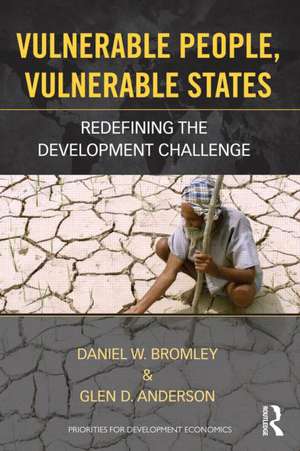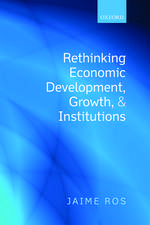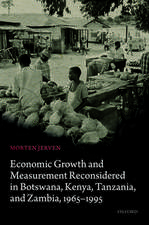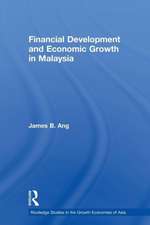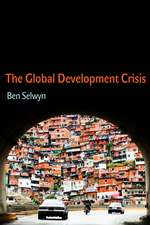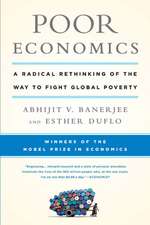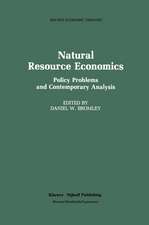Vulnerable People, Vulnerable States: Redefining the Development Challenge: Priorities for Development Economics
Autor Daniel Bromley, Glen Andersonen Limba Engleză Paperback – 21 iun 2012
This book challenges the dominant catechism of development assistance by arguing that the focus on economic growth (and fighting poverty) has failed to bring about the promised "convergence." Poor people and poor countries have clearly not closed the gap on the rich industrialized world. Pursuing convergence has been a failure. Here we argue that development assistance must be reconstituted to focus on creating economic coherence. People are vulnerable because the economies in which they are embedded do not cohere. The absence of economic coherence means that economic processes do not work as they must if individual initiative is to result in improved livelihoods. Weak and vulnerable states must be strengthened so that they can become partners in the process of creating economic coherence. When economies do not cohere, countries become breeding grounds for localized civil conflicts that often spill across national borders.
| Toate formatele și edițiile | Preț | Express |
|---|---|---|
| Paperback (1) | 480.62 lei 6-8 săpt. | |
| Taylor & Francis – 21 iun 2012 | 480.62 lei 6-8 săpt. | |
| Hardback (1) | 764.51 lei 6-8 săpt. | |
| Taylor & Francis – 22 iun 2012 | 764.51 lei 6-8 săpt. |
Preț: 480.62 lei
Nou
Puncte Express: 721
Preț estimativ în valută:
91.98€ • 95.67$ • 75.93£
91.98€ • 95.67$ • 75.93£
Carte tipărită la comandă
Livrare economică 14-28 aprilie
Preluare comenzi: 021 569.72.76
Specificații
ISBN-13: 9780415534543
ISBN-10: 0415534542
Pagini: 168
Ilustrații: 20
Dimensiuni: 156 x 234 x 10 mm
Greutate: 0.25 kg
Ediția:New.
Editura: Taylor & Francis
Colecția Routledge
Seria Priorities for Development Economics
Locul publicării:Oxford, United Kingdom
ISBN-10: 0415534542
Pagini: 168
Ilustrații: 20
Dimensiuni: 156 x 234 x 10 mm
Greutate: 0.25 kg
Ediția:New.
Editura: Taylor & Francis
Colecția Routledge
Seria Priorities for Development Economics
Locul publicării:Oxford, United Kingdom
Public țintă
Postgraduate and UndergraduateCuprins
1. From Convergence to Coherence: The New Development Opportunity 2. On Economic Coherence 3. Contending With Economic Incoherence: The Notional State 4. Creating Coherence: The Role of Institutions 5. Policy Reform as Institutional Innovation 6. The Diagnostic Imperative 7. From Diagnosis to Policy Reform 8. Working with the Policy-Reform Process 9. Toward Economic Coherence: A Practical Guide
Notă biografică
Daniel W. Bromley is Anderson-Bascom Professor (Emeritus) of applied economics at the University of Wisconsin-Madison, and Visiting Professor, Humboldt University-Berlin.
Glen D. Anderson is Senior Manager at International Resources Group, Washington, D.C.
Glen D. Anderson is Senior Manager at International Resources Group, Washington, D.C.
Recenzii
In the opening chapter of their new book, Daniel Bromley and Glen Anderson use the story of a Ghanaian farmer to vividly remind us that when the poor try to make a living, they face an insurmountable avalanche of barriers and costs. It is expensive being poor! And it makes them vulnerable. The reasons for their vulnerability? The rules that govern their economic lives are dysfunctional and incoherent. And because the poor cannot influence these many incoherent economic institutions, they become vulnerable.
To reduce vulnerability, the authors argue, we need to diagnose and repair the incoherence of the economic institutions that create the vulnerability. Creating economic coherence is, in the authors' view, a new and better development paradigm than the current one of fighting poverty through economic convergence, or removing binding constraints to growth. True, the authors concede, vulnerability has many aspects, and is difficult to measure. But better measurement of outcomes is not what will make a difference to the lives of those who are chronically vulnerable. Take the Millennium Development Goals. Because the MDGs focus on symptoms of, rather than reasons for, vulnerability, they do not provide the basis for a clear and practical strategy. Focusing on vulnerability and coherence, by contrast, holds the promise of giving us clarity of purpose and forcing us to think about causality and connections.
How to create more vulnerability-reducing coherence in an economy? Foster the enabling environment for markets to do their job, so that individuals can act, and transact, based on good information. Be clear about priorities and sequencing. Create the political space for innovation and adaptation. Etc. This book is not just about rethinking old concepts and suggesting powerful new ones. It is also a practical guide. Highly recommended!
Rogier van den Brink, World Bank, USA
This is a very important book that should be read as a sequel to the classical writings in economic development by Sachs, Easterly, and Collier. It is a hopeful book, with a pragmatic vision of how development can be successfully achieved for the bottom 1.4 billion vulnerable people. It stresses the need for a country to have a vision of its future, carry out comprehensive diagnostics of the multiple constraints to development and their causal determinants, seek economic coherence in institutional reforms, establish actionable program priorities, and thus achieve sustainable economic development that will reduce vulnerability to repeated shocks. The approach restores the role of the state in making markets work, takes us beyond the microeconomics of fighting poverty, and opens the door for a creative role for development experts. It is indeed a welcome new departure in how to address the development challenge—it should be broadly noted and debated.
Alain deJanvry, University of California-Berkeley, USA
The authors make the claim that the struggle for development ought to decisively focus on mitigating vulnerability of poor people and poor nations. This implies that instead of removing the symptoms of poverty, policies should aim at improving the coherence of the poor economies so that they become more responsive and adaptable to shocks. The idea is powerful and worthy of elaboration. The book forces us to think anew.
Jean-Philippe Platteau, University Faculties of Notre-Dame de la Paix, Namur, Belgium
Development assistance has not created significant results in Sub-Saharan Africa in the last 50 years. By redirecting our attention from income growth to the vulnerability of people and states, Daniel Bromley and Glen Anderson propose an agency-based approach for development assistance, that is, to increase the capabilities of people and states to create a coherent economic, social and political system. This is a paradigmatic change to the thinking of economic development.
Yang Yao, Director, China Center for Economic Research, Peking University, China
To reduce vulnerability, the authors argue, we need to diagnose and repair the incoherence of the economic institutions that create the vulnerability. Creating economic coherence is, in the authors' view, a new and better development paradigm than the current one of fighting poverty through economic convergence, or removing binding constraints to growth. True, the authors concede, vulnerability has many aspects, and is difficult to measure. But better measurement of outcomes is not what will make a difference to the lives of those who are chronically vulnerable. Take the Millennium Development Goals. Because the MDGs focus on symptoms of, rather than reasons for, vulnerability, they do not provide the basis for a clear and practical strategy. Focusing on vulnerability and coherence, by contrast, holds the promise of giving us clarity of purpose and forcing us to think about causality and connections.
How to create more vulnerability-reducing coherence in an economy? Foster the enabling environment for markets to do their job, so that individuals can act, and transact, based on good information. Be clear about priorities and sequencing. Create the political space for innovation and adaptation. Etc. This book is not just about rethinking old concepts and suggesting powerful new ones. It is also a practical guide. Highly recommended!
Rogier van den Brink, World Bank, USA
This is a very important book that should be read as a sequel to the classical writings in economic development by Sachs, Easterly, and Collier. It is a hopeful book, with a pragmatic vision of how development can be successfully achieved for the bottom 1.4 billion vulnerable people. It stresses the need for a country to have a vision of its future, carry out comprehensive diagnostics of the multiple constraints to development and their causal determinants, seek economic coherence in institutional reforms, establish actionable program priorities, and thus achieve sustainable economic development that will reduce vulnerability to repeated shocks. The approach restores the role of the state in making markets work, takes us beyond the microeconomics of fighting poverty, and opens the door for a creative role for development experts. It is indeed a welcome new departure in how to address the development challenge—it should be broadly noted and debated.
Alain deJanvry, University of California-Berkeley, USA
The authors make the claim that the struggle for development ought to decisively focus on mitigating vulnerability of poor people and poor nations. This implies that instead of removing the symptoms of poverty, policies should aim at improving the coherence of the poor economies so that they become more responsive and adaptable to shocks. The idea is powerful and worthy of elaboration. The book forces us to think anew.
Jean-Philippe Platteau, University Faculties of Notre-Dame de la Paix, Namur, Belgium
Development assistance has not created significant results in Sub-Saharan Africa in the last 50 years. By redirecting our attention from income growth to the vulnerability of people and states, Daniel Bromley and Glen Anderson propose an agency-based approach for development assistance, that is, to increase the capabilities of people and states to create a coherent economic, social and political system. This is a paradigmatic change to the thinking of economic development.
Yang Yao, Director, China Center for Economic Research, Peking University, China
Descriere
This book explains the necessary building blocks of economic coherence. It then develops a diagnostic approach to demonstrate how to identify impediments to the efficient functioning of essential economic processes. Finally, the book contains an extensive treatment of the policy-reform process, complete with a practical guide to how donors can work with governments to create economic coherence.
